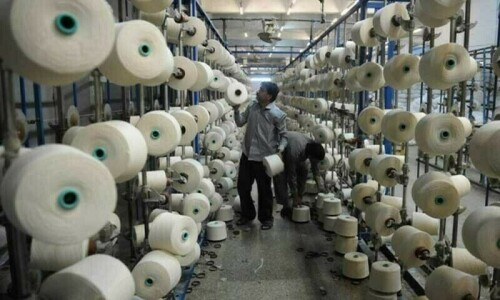
Just when they thought they had mastered the pattern of staging a coup without hurting their democratic credentials, things went wrong.
The then president, Ghulam Ishaq Khan, was following the standard operating procedure when he dismissed the government of Nawaz Sharif on April 18, 1993, using Article 58(2b) for the second time. But nothing seemed to go the way it was supposed to. The aggrieved party took legal recourse and the Supreme Court annulled the president’s order, restoring the government around 40 days after its dismissal.
But ‘the relief’ provided no solution; it upped the ante. The next round was enacted in provinces, especially in Punjab. The provincial assemblies were not dissolved but as the Sharif government had lost the first round at the federal level, elected members in Punjab abandoned the sinking ship. A no-confidence motion against Ghulam Haider Wyne, a Nawaz Sharif loyalist, succeeded and Manzoor Wattoo, representing an anti-Nawaz faction of the Muslim League, took the oath as the chief minister of Punjab.
But as the tide reversed in Islamabad, a no-confidence was moved against Wattoo. He advised the governor to dissolve the assembly; the governor, being the president’s appointee, immediately obliged. In courts again, the parties haggled over whether the dissolution of the assembly had been sought a minute before or after the submission of the no-confidence motion. Frustrated by the ongoing legal tussle, the prime minister ordered federal rule in the province but the president stopped its implementation.
The president and the prime minister had taken it too far and their differences had become too personal. The army jumped in and brokered a compromise that saw both of them out of their offices.
The then chairman of the Senate, Wasim Sajjad, took over as acting president and a hitherto unknown person, Moeen Qureshi, was sworn in as the caretaker prime minister. He had served as a senior bureaucrat at the World Bank, mostly outside the country. Fresh elections were announced for October 1993.
The army became the de facto ruler of the country and dominated the administration of the elections. Judicial officers, aided by deputy commissioners and other officers of the district administration, had been the main electoral machinery since 1988. The civil services were now considered too biased in Nawaz Sharif’s favour and were thus kept out. Judicial officers were aided by officers from the army that had set up a hierarchy running parallel to the one put in place by the Election Commission of Pakistan (ECP). Two to three army personnel were deputed at each polling station, though they were assigned no polling-related function.
The caretakers made it mandatory for candidates to declare in writing that they were not loan defaulters. Persons who had got their loans written off after March 23, 1985 (when the Junejo government took over under President Ziaul Haq) were also barred from contesting elections.
For the first time, candidates were also required to submit details of their own, their spouses’ and dependents’ assets and liabilities. The ECP was barred from officially notifying the name of the winning candidates unless this submission had been made. But since the rules had not prescribed any standard format, each parliamentarian-elect did it differently.
The authorities also attempted to cleanse the election campaigns. The code barred candidates from calling each other infidels and also prevented them from launching propaganda against female candidates on the basis of their gender.
The Pakistan Muslim League finally broke out of the Islami Jamhoori Ittehad (IJI) shell. A faction that had fallen out with Nawaz Sharif took the suffix Junejo (PML-J) while the main party named itself PML-Nawaz. The PML-J won for itself the election symbol of the bicycle that had been used by the IJI in the past two elections. The PML-N went for the tiger that had been the symbol of the PML-Qayyum, the anti-Ayub Khan Muslim League, during the general elections of 1970 and 1977.
Nevertheless, the PML-N rose as the main centre-right party. Though it could not form government after the 1993 elections, it kept its vote bank intact. The six million votes that had purportedly been deposited by the ‘establishment’ in the IJI’s account in 1988 now moved to Nawaz Sharif’s account, while his politics earned him an interest of two million additional votes.
Consequently, the other major partner in the IJI, the Jamaat-i-Islami, went bankrupt. The party’s head Qazi Hussain Ahmed tried to inject some enthusiasm into its dejected ranks. Ostensibly wanting to emulate the steep rise of the Islamic Salvation Front in Algiers (December 1991), he decided to contest elections under the name Pakistan Islamic Front; its election symbol of the car, however, took it nowhere. It polled a total of 650,000 votes, winning three national seats.
The infamous clean-up operation in Karachi was halfway through at the time. It had started following an unprecedented spate of violence in the metropolis and saw the arrest, killing and disappearance of a number of workers of what was then the Mohajir Qaumi Movement (MQM). The party’s supremo, Altaf Hussain, had slipped out of the country weeks before the operation and taken refuge in the UK.
The MQM had participated independently or under the banner of the Haq Parast Group in previous elections. It was told by the military to stay away from elections to the National Assembly. It thus announced a boycott of the 1993 elections though the party’s candidates contested provincial constituencies and maintained electoral supremacy.













































